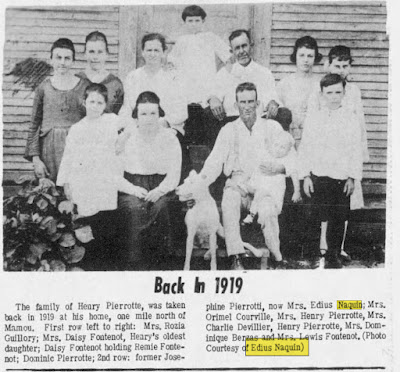Edius Naquin was born on March 16th, 1901, in Ville Platte, Louisiana, to parents Leo and Ozella "Ozea" Devillier Naquin. Leo was a descendant of early French settlers of Acadie (Nova Scotia), while Ozella's descendants originated from France. Leo worked in different saw mills and was also a sharecropper. Like many farming families, music provided a brief respite from a hard day of laboring in the fields and entertainment for the weekend. Edius grew up with seven other siblings, one older brother, three younger sisters and three younger brothers. One of Eduis's brothers gave him a violin when he was 11 years old. He started playing music by the time he was twelve. He learned songs from his grandmother Elisabeth Sherman "Babe" Devillier and his grandfather Justilien Devillier who played violin and taught him those songs of hers. He would whistle and sing the old tunes he was taught every chance he got, from waking up in the morning, working in the fields, and up until nighttime. When he was a young man him and his family moved to Grand Prairie, then to Pointe Aux Pins, then back to Ville Platte. Edius became the oldest of the siblings when he was sixteen, when his older brother Ovil died serving in the US Infantry in WWI in 1917, and he took a job to help out the family, bringing home $6 a month. He would work from farm to farm for the next forty years. Tragedy struck the Naquin's the following year in 1918, when Edius's mother Ozella passed away. The following year in 1919, he married Josephine Pierrotti . They eventually would settle near the community of Reddell, not far from his mother’s family, where he worked with his father-in-law and her uncle. They eventually would live on Josephine's brother Ulysses Pierroti's farm. Eduis would learn more songs from his brother-in-law and sister-in-law, who both sang old French tunes. When a few years had passed, Edius earned enough extra money to buy him an accordion and an harmonica, which he quickly picked up. Naquin didn't play in a band starting out, opting to play multiple instruments by himself or with a few family members. He began playing at house dances for pay around the L'anse Johnson community, near Ville Platte. Edius quickly realized that besides his love for the music, he was able to supplement his income along with farming to help provide for his family through the years. In 1960, Edius was a part of a twenty five member local contingent of civic leaders, businessmen and promotors from the Mamou area to attend the National Folk Festival, which was held in Washington D.C. that year. The group was part of the Mamou Mardi Gras Association and furnished Cajun music, and dancing at the festival. Among the twenty five were a group of six musicians: Edius, Isom Fontenot, Shelby Vidrine, Cyprien Landreneau, Dudley Rozas, and Adam Landreneau. This was the 1st time for a Cajun group to play music outside the Louisiana border since the Broussards/Walker group in 1948/49. One interesting story from that trip was the plane ride. Apparently the planes pilot had requested the group to play music during the flight, causing them to set a new record for the highest Cajun music jam session at 33,000 feet above sea level. ( Must have been a wild ride ). At the age of 65, Edius retired. Him and Josephine moved back into his 1st little house. He would entertain many visitors during those years, as he had made a name for himself with his music. He was a member of a group of men called the Mamou Supper Club. They would get together and cook, have a few beverages, have jam sessions, and share stories. In the late 1960's, a group of men consisting of Ralph Rinzler, the assistant secretary of the Smithsonian Institute and a scout for the Newport Folk Festival, recorder Gerard Dole of France, interviewer Gerald Gold, and film editor Andre Galdu visited Edius in his home and in the town of Mamou. They recorded Edius playing songs such as "Mercredi Passe" and "Hack A Tit Moreau". In 1975, he was a part of a fifteen band tribute to Cajun Music sponsored by CODOFIL at the Blackham Coliseum in Lafayette to a packed house of around 12,000 people. The event was so popular hundreds had to be turned away. Some of the notable names that also played the event was : Happy Fats, The Deshotels Brothers, Lionel Leleux, Don Montoucet, Camy Doucet, Ambroise Thibodeaux, Blackie Forestier, Merlin Fontenot, Bois Sec Ardoin, Jimmy C Newman, and Rufus Thibodeaux. The following year in 1976, Edius again would return to Lafayette to perform at the Cajun Music Festival sponsored by CODOFIL, this time being held at the Girard Park Amphitheater. Other headliners that year included Aldus Roger and the Lafayette Playboys, The Balfa Brothers, The Deshohotel Brothers, Camey Doucet, Ambroise Thibodeaux, Octa Clark ,Nathan Abshire, The Mamou Cajun Band, among others. Edius had several recordings that appeared on multiple compilation albums put out in the later years from 1976-2010. He has a grandson, Kevin Naquin who is a force in Cajun music today and proudly carries on his grandfathers surname. Edius passed away on November 13,th 1985 and is buried in Mamou. Thanks to the Evangeline News archives, Eunice News Archives, Opelousas Daily World archives, Jerry Devillier, Alex Deshotels, Wade Falcon, Author Ann Savoy's book Cajun Music Vol II, Ancestry.com. for their contribution to this article. Composed by Neal P Granger.
1960 trip to the National Folk Festival held in Washington, D.C. that year.
Mamou Acadian Press clipping in 1974. In-laws and wife of Edius.
Mamou Acadian Press clipping from 1975. Basile Weekly press clipping in 1976






